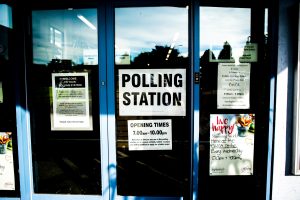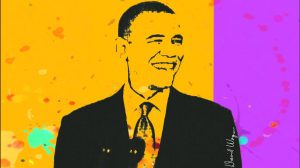Bearings
The Religious Impulse and Reality Show Politics
By Tripp Hudgins
April 2019 Issue

Perhaps you have noticed the increasingly large number of candidates putting their names forward for the Democratic presidential primary election. With the current president's popularity in constant question and his policies being excoriated by every news outlet not owned by Rupert Murdock, there are a lot of people hoping that the vultures are circling and that there is a reasonable chance for a Democrat to defeat the sitting President in the 2020 general election. This is not surprising even if it is newsworthy. What is surprising or shocking in it's cynical predictability is the continuing support of white evangelical Christians for President Trump.
 On March 19, the Pew Research Center released the results of a study tracking the denominational affiliation of those supporting Trump. Their study suggests that though there is diminishing support among most religious groups, the support he receives from white evangelical Christians remains strong at 69% of those surveyed. Some of these supporters are single-issue voters supporting a "right to life" agenda while others are adherents to ideologies more complex and convoluted ranging from President Trump being God's chosen leader to a general distrust of any policies that smack of "socialism" as their theology of free will extends to the marketplace and neo-liberal economic theories. The bottom line is that political movement for which Donald Trump serves as a symbolic leader is also a religious movement.
On March 19, the Pew Research Center released the results of a study tracking the denominational affiliation of those supporting Trump. Their study suggests that though there is diminishing support among most religious groups, the support he receives from white evangelical Christians remains strong at 69% of those surveyed. Some of these supporters are single-issue voters supporting a "right to life" agenda while others are adherents to ideologies more complex and convoluted ranging from President Trump being God's chosen leader to a general distrust of any policies that smack of "socialism" as their theology of free will extends to the marketplace and neo-liberal economic theories. The bottom line is that political movement for which Donald Trump serves as a symbolic leader is also a religious movement.
What also makes this new poll newsworthy is how such a reality can be understood as a catalyst for how opposing candidates will present themselves as not just a political alternative to Donald Trump, but as a theological alternative to Donald Trump. As conservative white Christians in general and conservative white evangelicals in particular maintain their support of the President and his policies, opponents will show how they oppose his theology as well as his policies.
No longer does a candidate need to be a "Bible-toting, church-going believer." In fact, it might be better if they are not. Such positioning away from more conservative and even moderate iterations of Christian faith sets them apart from one of the least popular Presidents in recent history. And if a candidate does hope to garner some explicitly Christian support, they are wise to align themselves with more progressive individuals, organizations and ideologies rather than the more conservative or moderate.
To respond, candidates are talking about how their faith informs their progressive politics. They are trying to be seen with the likes of Dr. William Barber of Moral Mondays and now with the Poor People's Campaign or they are aligning themselves with organizations like Sojourners, a progressive evangelical organization founded by Jim Wallis. A few years ago, for example, I met Cory Booker at a Sojourners sponsored event. It was clear to me then that he was contemplating how to connect to us as another religious progressive. And we were keen to welcome him into our community.
Political candidates try many rhetorical strategies. The language of the Civil Rights Movement is, of course, helpful. Still, as evocative as it is, that language is dated. So, candidates are also finding new language or avoiding it all together. Kamala Harris has not been explicitly religious. Neither have many other candidates. But they will.
This is not all that's going on in this election season. There's another layer of complexity to this religious complexity that we need to address. We're all in a reality show.
My interest in religious studies typically centers on movements in popular culture (specifically music) and how religious impulses are expressed within it. Beyonce to Springsteen, I want to know how we connect the holy to pop culture. With our current president, this interest has found a new home in the pop culture of American politics. We joke that we are in the midst of the presidency as a reality show, but that's not far from the truth. And the American reality show is a pop culture phenomenon.
Pop culture is simply the cultural tropes and symbols that are getting the most traction in a certain moment. Pop culture is not necessarily shallow, fleeting, or faddish, though it can be. Some moments last longer than others. "Lemonade" by Beyonce, for example, is far from shallow and certainly not faddish. Bruce Springsteen's career is similarly understood and it spans decades. That said, "The Macarena" is (or was) also pop culture.
With this understanding, reality television is pop culture. It is immensely popular in the broadest sense—to the masses. It is present on a multiplicity of broadcast and social media as well is in consumer products. There are several shows that have enjoyed incredible longevity.
As is well known, our current president rose to recent fame by hosting his own reality television show. This fact is often mentioned by journalists in passing or passing humor. The trouble with that response is that it underplays the politically strategic importance of the reality show aesthetic. Donald Trump is confusing most of his political opponents and allies alike by treating the office of the President of the United States as a popularity contest, as entertainment, and as something he can drive with his whims and quirks just as he did his reality television show to great success. This is not a populist president. Trump is a pop culture president.

We are in the throes of a reality show presidency and what will surely be a reality show primary and general elections. People will be voted off the island regularly. We'll get to cast our own votes and freely, boldly, explicitly name our reasons no matter how base, banal, or cruel. Anything goes. This will include how people express themselves religiously. It's all entertainment now. It's all about views, clicks, and ratings rather than substantive policy. This includes religious expression.
With that, let's turn to the recent event where attendees asked the president to sign their Bibles. Though criticized by pundits both conservative and liberal alike, the event itself is indicative of where we might be headed as a nation in which celebrity politicians like Donald Trump also signify something profoundly religious to their supporters. President Trump is certainly not the first president to use the religious impulse to great political effect.
 We saw some of it with the affection many demonstrated and still express for Barack Obama. Though he did not nurture it or take obvious advantage of it, there was much religious language and imagery used to describe his importance for the African American community. He even sang "Amazing Grace" from the pulpit of at Senator Clementa Pickney's funeral. Senator Pickney was one of the victims of the shooting in Charleston, South Carolina. White supremacy claimed a civic leader who also happened to be a Christian religious leader. Our president, a fellow Christian, eulogized him with words and by singing, "Amazing Grace." It was deemed an incredible display of religious emotion by a typically stoic president. I also imagine that some people have President Obama's picture or even signature placed with other items of religious significance in their homes.
We saw some of it with the affection many demonstrated and still express for Barack Obama. Though he did not nurture it or take obvious advantage of it, there was much religious language and imagery used to describe his importance for the African American community. He even sang "Amazing Grace" from the pulpit of at Senator Clementa Pickney's funeral. Senator Pickney was one of the victims of the shooting in Charleston, South Carolina. White supremacy claimed a civic leader who also happened to be a Christian religious leader. Our president, a fellow Christian, eulogized him with words and by singing, "Amazing Grace." It was deemed an incredible display of religious emotion by a typically stoic president. I also imagine that some people have President Obama's picture or even signature placed with other items of religious significance in their homes.
What is curious about Donald Trump's approach is the "reality television" strategy of it all. There is a sensationalism, a kind of intentional entertainment that is associated with it. It is televangelism as reality show as political strategy. I assume that this will not be relegated only to those on the religious right. We will see the same with supporters of Democratic candidates as well. If the political strategy continues to be more and more effective, we will see the same kind of sensationalism come from the religious left as well. Liberal politicians will take up the more sensational aspects of left wing activism, specifically the religious overtones of that activism. They will march more. They will shout populist slogans. They will write OpEd pieces in progressive religious magazines and on websites. They will absolutely sign Bibles.
I offer all of this with no hint of cynicism. I offer this insight simply to encourage us to ask the question: Is this who we want to be? Or, put another way: Is this how we wish to be religious?
Perhaps it's inevitable. We mythologize our political figures all the time. Our "Founding Fathers" take on Greco-Roman dimensions in the statuary and monuments that decorate civic squares and buildings across the nation. President Kennedy's White House was dubbed "Camelot." He was a present day King Arthur. In this way, we are doing what we are always doing.
And yet, I believe this combination is particularly powerful. We need to pay attention. Otherwise, some of us might be very surprised to find ourselves voted off the island.
Photo Credits:
Featured Image: Ann Kathrin Bopp, "Outdoor Desert Art Museum" (January 14, 2018). Via Unsplash. CC 2.0 license.
Body Photo #1: Elliott Stallion, Untitled (June 24, 2016). Via Unsplash. CC 2.0 license.
Body Photo #2: Unattributed, "Election America Donald Donald Trump Politician" (ND). Via MaxPixel. CC0 license.
Body Photo #2" Unattributed, "Barak Obama 23" (ND). Via PublicDomainImages. CC0 license.

